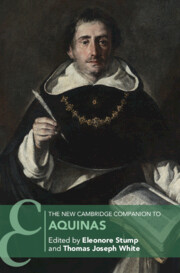Book contents
- The New Cambridge Companion to Aquinas
- Other Volumes in the Series of Cambridge Companions
- The New Cambridge Companion to Aquinas
- Copyright page
- For our teachers
- Contents
- Contributors
- Abbreviations
- A Select List of Aquinas’s Works
- Introduction
- Part I Life and Works
- Part II Metaphysics and the Ultimate Foundation of Reality
- 2 First Principles
- 3 Essence and Existence, God’s Simplicity and Trinity
- 4 Goodness and Being, Transcendentals, Participation
- 5 The Metaphysics of Creation
- 6 The Nature of Human Beings
- Part III Epistemology
- Part IV Ethics
- Part V Philosophical Theology
- Bibliography
- Index
- Other Volumes in the Series of Cambridge Companions (continued from page ii)
2 - First Principles
Hylomorphism and Causation
from Part II - Metaphysics and the Ultimate Foundation of Reality
Published online by Cambridge University Press: 30 July 2022
- The New Cambridge Companion to Aquinas
- Other Volumes in the Series of Cambridge Companions
- The New Cambridge Companion to Aquinas
- Copyright page
- For our teachers
- Contents
- Contributors
- Abbreviations
- A Select List of Aquinas’s Works
- Introduction
- Part I Life and Works
- Part II Metaphysics and the Ultimate Foundation of Reality
- 2 First Principles
- 3 Essence and Existence, God’s Simplicity and Trinity
- 4 Goodness and Being, Transcendentals, Participation
- 5 The Metaphysics of Creation
- 6 The Nature of Human Beings
- Part III Epistemology
- Part IV Ethics
- Part V Philosophical Theology
- Bibliography
- Index
- Other Volumes in the Series of Cambridge Companions (continued from page ii)
Summary
Matter and form are two notions lying at the very heart of Aquinas’s broadly Aristotelian conception of reality. Aquinas inherits these notions from Aristotle (hyle and morphe in Greek), and his understanding of each is shaped to a large extent by the various uses to which Aristotle himself puts them. Even so, the precise nature of Aquinas’s hylomorphism, as well as its centrality in his thought, are of independent significance. Indeed, it would be impossible to understand Aquinas’s fundamental divisions of reality – including the division of God and creature, substance and accident, body and spirit – apart from his own particular conception of matter and form. It would also be impossible, apart from this same conception, to appreciate the elements of an explanatory framework that Aquinas deploys in almost all his writings – including potentiality and actuality, principles and causes, and the fourfold division of causes into material, formal, efficient, and final. In short, to acquire a familiarity with the details of Aquinas’s understanding of matter and form is almost to become accustomed to his distinctive vision of reality.
- Type
- Chapter
- Information
- The New Cambridge Companion to Aquinas , pp. 31 - 56Publisher: Cambridge University PressPrint publication year: 2022



